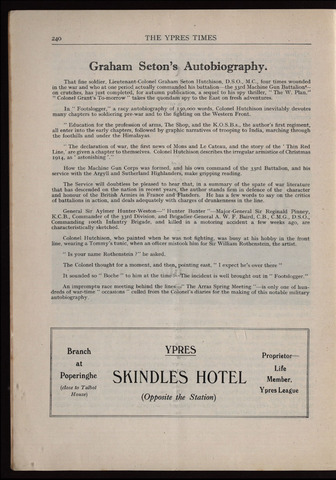Graham Seton's Autobiography.
Branch
YPRES
at
Poperinghe
240
THE YPRES TIMES
That fine soldier, Lieutenant-Colonel Graham Seton Hutchison, D.S.O., M.C., four times wounded
in the war and who at one period actually commanded his battalionthe 33rd Machine Gun Battalion—
on crutches, has just completed, for autumn publication, a sequel to his spy thriller, The W. Plan."
Colonel Grant's To-morrow takes the quondam spy to the East on fresh adventures.
In Footslogger," a racy autobiography of 150,000 words, Colonel Hutchison inevitably devotes
many chapters to soldiering pre-war and to the fighting on the Western Front.
Education for the profession of arms, The Shop, and the K.O.S.B.s., the author's first regiment,
all enter into the early chapters, followed by graphic narratives of trooping to India, marching through
the foothills and under the Himalayas.
The declaration of war, the first news of Mons and Le Cateau, and the story of the Thin Red
Line,are given a chapter to themselves. Colonel Hutchison describes the irregular armistice of Christmas
1914, as astonishing
How the Machine Gun Corps was formed, and his own command of the 33rd Battalion, and his
service with the Argyll and Sutherland Highlanders, make gripping reading.
The Service will doubtless be pleased to hear that, in a summary of the spate of war literature
that has descended on the nation in recent years, the author stands firm in defence of the character
and honour of the British Armies in France and Flanders. He has a few words to say on the critics
of battalions in action, and deals adequately with charges of drunkenness in the line.
General Sir Aylmer Hunter-WestonHunter Bunter Major-General Sir Reginald Pinney,
K.C.B., Commander of the 33rd Division, and Brigadier-General A. W. F. Baird, C.B., C.M.G., D.S.O.,
Commanding 100th Infantry Brigade, and killed in a motoring accident a few weeks ago, are
characteristically sketched.
Colonel Hutchison, who painted when he was not fighting, was busy at his hobby in the front
line, wearing a Tommy's tunic, when an officer mistook him for Sir William Rothenstein, the artist.
Is your name Rothenstein he asked.
The Colonel thought for a moment, and then, pointing east, I expect he's over there
It sounded so Boche to him at the time The incident is well brought out in Footslogger."
An impromptu race meeting behind the linesThe Arras Spring Meeting is only one of hun
dreds of war-time occasions culled from the Colonel's diaries for the making of this notable military
autobiography.
Proprietor
Life
Member,
Ypres League
(close to Talbot
House)
Opposite the Station)

